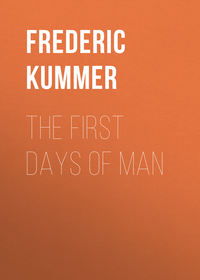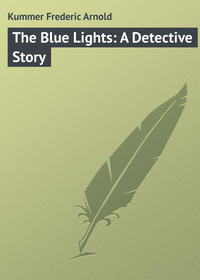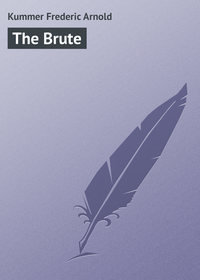 полная версия
полная версияThe Film of Fear
Suddenly he saw the lovely face of Ruth Morton, as the girl appeared from an open doorway. She did not take part in the picture at once, but stood chatting with the director, awaiting the moment when she would make her entrance. Duvall watched her intently. Her face, he thought, was drawn, nervous, her expression one of fear. She seemed suspicious of every one who came near her, as though she suspected that every stage hand, every electrician or helper, had in his possession a bottle of vitriol, which he only awaited the moment to hurl in her face. That the girl's nervous manner, her strained and tense expression, was evident to others as well as to himself, he realized from a remark his companion made to him.
"Miss Morton doesn't seem herself to-day," he said. "She must have something on her mind. I shouldn't be surprised if she has been working too hard lately."
Duvall made no reply. He was watching, not only Ruth, but those about her. In particular he observed the other women in the cast. It seemed not improbable that among them he would find the one whose envy had led to the sending of the threats Ruth had been receiving.
Presently the scene was finished, and Ruth, in response to a call from Duvall's companion, came toward them.
"Miss Morton," the latter said, "let me present Mr. Richards." This was the name Duvall had given. "He is anxious to meet you, and write you up for one of the newspapers."
Ruth gave him her hand with a smile which Duvall saw clearly enough was forced. The girl was palpably worn, distrait.
"I'm not going to interview you now, Miss Morton," he said. "I can understand that you must be tired, after posing all the morning. Let me come and see you sometime when you are more at leisure."
She thanked him with a smile, this time quite genuine.
"I'm not feeling very well this afternoon," she said. "Come to my home some evening, or better still, on Sunday, and I'll tell you all I know about being a 'movie' star. So glad to have met you." She was just about to turn away, when a small boy came up, carrying in his hand a flat package, wrapped in brown paper. Duvall observed that the package had upon it a typewritten address.
"Something for you, Miss Morton," he said, and placed the package in Ruth's hand.
The girl looked at it for a moment in dismay. Then realizing that the eyes of the two men were bent curiously upon her, she recovered herself and tore open the brown paper envelope. Duvall, with one eye on the boy, saw that he had disappeared through the door leading to the company's executive offices.
Suddenly Ruth, who had been examining the contents of the package, gave a faint cry, and swayed backward, as though about to fall. Duvall's companion sprang to her assistance, while Duvall himself snatched the object which had so affected her from her hand and hastily examined it.
It was a photograph of Ruth Morton herself, but Duvall, as he gazed at it, comprehended instantly the effect it had produced upon the girl's over-wrought nerves. Some clever hand had been at work upon the photograph, retouching it, changing its lovely expression, until the portrait, instead of being a thing of beauty, grinned up at him in frightful hideousness. The blank, sightless eyes, the haggard cheeks, the thin wasted lips, the protruding and jagged teeth, all created an impression shocking beyond belief. And yet, the result had been obtained by the addition of but a few simple lines and shadows.
Along the blank space at the bottom of the picture a line of typewritten characters had been placed. Duvall glanced at them. "As you will look soon," the words read. Below them was fixed the grinning Death's head seal. Unobserved in the confusion, Duvall thrust the photograph into his pocket, and turned to Ruth and the others.
The girl had recovered herself by now, and was being conducted to her dressing room by a solicitous crowd. So far as Duvall would see, she had said nothing to those about her as to the cause of her sudden indisposition, and with the exception of the man who had been Duvall's guide, none of them had observed the opening of the package containing the photograph, nor its immediate effect upon her.
The latter, however, whose name was Baker, came over to Duvall and addressed him.
"What was it about that photograph that upset Miss Morton so?" he asked. "And what has become of it?"
Duvall drew him to one side.
"Let us go to your office, Mr. Baker," he said. "I have a most important matter to discuss with you."
Baker regarded the detective for a moment in surprise, then, seeing that Duvall was very much in earnest, he led the way to his private office.
"I am not a newspaper writer, Mr. Baker," Duvall said, as soon as they were seated. "As a matter of fact, I am a detective, in the employ of Mrs. Morton, Ruth Morton's mother."
"A detective?" he questioned. "Why has Miss Morton's mother employed a detective?"
"Because someone is persecuting the girl, by sending her threatening letters, saying that her beauty is to be destroyed. This photograph" – he drew the hideous picture from his pocket – "is a sample of their work."
Mr. Baker regarded the photograph for a moment in silence, then rose with a growl of rage and struck his clenched fist upon the desk.
"This is outrageous – damnable!" he cried. "It cannot go on. No wonder the poor girl looked tired out. We will put the matter in the hands of the police. We will spend any amount of money – "
"Wait a moment, Mr. Baker," Duvall interrupted, urging the angry man back into his chair. "Nothing is to be gained by giving any publicity to this matter. The scoundrels who are at the bottom of it will at once be warned, and then our chance of catching them will be small indeed. So far, not a soul knows that I am working on this case, outside of Mrs. Morton, and yourself. Even Miss Ruth does not know it. I have already unearthed some very surprising things connected with the case, although I have been occupied with it only since this morning. Within a few days, I have no doubt, I shall be able to place my hands upon the person or persons responsible for the trouble, but I must insist that I be given a free hand."
"But," Mr. Baker expostulated, "she may be in immediate danger. At any moment something may happen that would ruin her beauty, and incidentally, ruin us as well. She is our star attraction."
"I do not think the danger is immediate," Duvall replied gravely. "All the threats so far received set thirty days as the period within which the attack is to be made. Only three days have passed, so far. And in addition, Miss Morton is being very carefully guarded."
"She certainly shall be while she is here at the studio," Mr. Baker exclaimed. "But, man, something ought to be done – at once."
"The first thing to be done is to find out how that photograph got here – who brought it – and when. It was not delivered by mail. Look here." He handed the angry official the torn manilla envelope, which Ruth, in her excitement, had dropped upon the floor.
Mr. Baker regarded it for a moment in angry silence, then pressed an electric button upon his desk. A young woman responded.
"Send Jim here," he said. The girl nodded and withdrew.
A few moments later a freckled-faced boy of twelve or fourteen came in. Duvall saw that it was the same boy who had brought in the photograph.
"You sent for me, sir?" he asked.
"Yes. Where did you get the package you delivered to Miss Morton a little while ago?"
"From Mr. Curry, sir."
"Good." Mr. Baker rose and went toward the door. "Come with me," he said to Duvall, "and you too, Jim." The three of them went along the corridor, arriving presently at the main entrance to the building. An elderly man sat at a high desk behind a wire grating.
"Curry," Mr. Baker burst out, "this boy tells me you gave him a package for Miss Morton a while ago."
"Yes, sir."
"Where did you get it?"
The man looked up in surprise.
"Why, sir, someone left it here – on my desk. I don't know who, sir. Right after lunch, it was. You know people deliver things here all the time. I didn't take any particular notice how it got here. It was just pushed through the window, I guess, same as usual. There was a lot of mail in the rack, after lunch, and everybody asking for theirs as they came in. In fact, I don't remember seeing the package handed in at all. Just found it lying on my desk, along with a lot of letters and things. Why, sir? Is anything wrong?"
Baker turned to Duvall in disgust.
"No system here at all," he grumbled. "The trail is lost, of course. Half a hundred people come through here every hour. That's all, Jim," he said, turning to the boy, who disappeared at once. Accompanied by Duvall, Baker returned to the private office.
"Well?" Mr. Baker asked. "What next?"
"How many typewriters have you in your offices, Mr. Baker? Machines, I mean, not operators."
"About thirty, I guess. Or maybe thirty-five. Why?"
"I want you to get me a sample of the writing of each machine, without letting anyone know about it. Put each one on a separate sheet of paper, with a note added, stating whose machine it is – that is, in whose office."
Mr. Baker nodded. "I'll do it to-night," he said. "Attend to it myself. I see your idea. You think this thing is the work of someone inside the studio."
"It may be, I don't know. But I mean to find out."
"All right. Anything else?"
"Yes. Tell me something about this new film you've just gotten out. 'An American Beauty,' I think it is called."
Mr. Baker's manner became enthusiastic.
"Greatest film Ruth Morton ever did," he exclaimed. "A knockout. It is to be shown at the Grand, on Broadway, to-morrow night. First time on the screen. You'd better look it over."
"I probably shall. Now, tell me this. If I wanted to add anything to that picture, put in an insert, I believe you call it, could I do so, if I told you about it to-morrow?"
"Well – it might be done," Mr. Baker replied, dubiously. "But we wouldn't want to change the film any. It's perfect as it is."
"I don't doubt that. I have no idea of improving it in any way. But it is just possible that I may have a scheme that will help us to catch these people who are threatening Miss Morton. I'll tell you more about it, to-morrow. Meanwhile, don't forget about the typewriter samples. I'll see you in the morning." He rose. "And for the present, I think it would be best for you to keep what I have told you to yourself."
Mr. Baker nodded.
"I'll do that," he said, putting out his hand. "For the present, at least. But don't forget, Mr. Duvall, that this is a very vital matter to our company, and we can't afford to take any chances."
"I realize that fully. You can depend on me. I intend to save Miss Morton from any harm, not primarily on your company's account, but on her own. Good day."
"Good day, and the best of luck."
Duvall went toward the entrance, and in the corridor met Mrs. Morton. She was about to pass him, but he detained her.
"Twenty-seven days more," he whispered to her. She turned sharply, a look of fear upon her face, but as she recognized Duvall, her expression changed.
"Oh – it's you," she exclaimed. "I've just come down in the car, to take Ruth home. Is everything all right?"
"Yes, so far. At least no harm has come to your daughter. But I am sorry to say that she has received another warning."
"Here?" Mrs. Morton started, and glanced about in alarm.
"Yes."
"What was it?"
"A photograph." Duvall explained the contents of the mysterious package, but did not show the hideous picture to the girl's mother.
"And you haven't found out anything yet?"
"Nothing definite. There has scarcely been time. But we will. You may be sure of that."
"Have you seen Ruth?" Mrs. Morton asked.
"Yes. Mr. Baker introduced me to her. She thinks I am a newspaper man, who wants to write a special article about her for one of the Sunday papers. She suggested that I call at your house some evening, or possibly Sunday. If you are going back to town soon, I think it might be a good idea for me to drive back with you."
"By all means. I shall feel much safer. Suppose you wait for us at the entrance. I shall not be long."
Duvall nodded, and strolled toward the street, his mind busy with the events of the day. He stood for quite a while near the door, watching the people who came in and out. Many of them were women. He wondered if among them was the woman who was responsible for the threats of the past three days. It seemed improbable, and yet, there were indications that it was within the studio, rather than outside it, that the guilty person was to be found.
Mrs. Morton came out presently, accompanied by Ruth. The girl looked pale and troubled. Duvall went up to her.
"I have met your mother, Miss Morton," he said, "and she has very kindly suggested that I ride back to the city with you."
The girl nodded, without particular interest.
"We shall be very glad to have you," she said, "but you will excuse me, I know, if I do not talk to you about my work. I am feeling rather bad to-day, and I'm sure I couldn't tell you anything interesting."
"I'm sure I would not expect it, under the circumstances," Duvall replied, as Miss Morton, accompanied by her mother, went toward the automobile that stood near the entrance. "I don't doubt your work is full of trying incidents."
"Oh, it isn't my work," the girl replied, as he assisted her into the car. "I love my work. But there are other things." She glanced toward her mother with a tired smile, then sank back upon the cushions.
A moment later they were whirling toward the city.
CHAPTER VI
Duvall's ride back to town with Mrs. Morton and Ruth was quite uneventful. The latter, as she had explained, was ill, weak, indisposed to talk. Duvall and Mrs. Morton kept up a brisk conversation upon topics of the day, but both knew that it was of the girl they were thinking, and their interest in the subjects they discussed was clearly forced. Both were glad when the car at last stopped before the apartment building, and the long ride was over.
Mrs. Morton invited Duvall to come in and dine with them, and he promptly accepted. Ruth seemed indifferent. Assisted by her maid, she left the car and on reaching the apartment, at once went to her room.
"You will excuse me, I know," she said to Duvall. "I am tired out, and think I had better lie down at once. Nora will bring me some dinner," she said, turning to her mother.
Duvall and Mrs. Morton ate their dinner in silence. Some sense of oppression, of impending evil, hung over them both. Mrs. Morton left the table toward the close of the meal, and went to her daughter's room. With the solicitude of the typical mother she arranged the windows. That opening to the fire escape she raised to its full height. The one facing upon the court she left as it was, raised some six or eight inches. Then, having kissed her daughter good night, she returned to the library, where Duvall sat smoking a cigar.
"Ruth has gone to bed," she told him. "Both the windows in her room are open, the one on the fire-escape wide, the other partly raised."
Duvall looked at her with an expression of doubt.
"I think it would be better, for the present," he said, "to close and fasten the one opening on the fire escape. We cannot tell to what danger your daughter may be exposed."
Mrs. Morton rose and left the room.
"I will do as you advise," she said. Going to Ruth's bedroom she closed and fastened the window in question, then she went back to the library.
"Have you hit upon any theory to account for the sending of these letters?" she asked.
Duvall shook his head. "The whole thing is very mysterious," he said. "Of course it was easy enough for anyone to leave the photograph at the studio this afternoon. In fact it might readily have been done by one of the other actresses, who might be jealous of your daughter's success. But if the thing was done by anyone employed at the studio, how can we account for the message left in the bedroom at half-past nine this morning, the one we found on the floor? If the woman who is responsible for these threats was at the studio this morning, how could she arrange to have the note left in your daughter's bedroom here at the same hour? That would seem to imply a confederate. I confess that the entire matter is for the moment beyond me."
"Were you able to find out anything concerning the telegram which came this morning?"
"Nothing, except that it was sent by a woman. I was not surprised to learn that. Naturally I should expect that a woman was responsible for these threats. But what woman? That is the question." He sat for a long time, thinking, his eyes fixed upon the floor.
Suddenly there came a ring at the doorbell. Mrs. Morton, without waiting for the maid, sprang to the hall, with Duvall close at her heels. As she threw it open, they saw a man standing in the doorway. Duvall was the first to recognize their caller.
"How do you do, Mr. Baker," he said, holding out his hand.
Mr. Baker came in, and greeted Mrs. Morton.
"I didn't expect to find Mr. Duvall here," he said. "In fact, I came to you to get his hotel address. Luckily I won't need it, now."
"Anything new?" Duvall asked, as they returned to the library.
"Nothing much. I got those samples of the writing of the various typewriters, as you requested," Baker replied, "and I thought that instead of waiting until to-morrow, it would be better to bring them to you to-night." He took a sheaf of papers from his pocket. "There are thirty-two in all. What are you going to do with them?" He placed the papers in Duvall's hand.
The latter sat down at the library table and placed the sheets of paper before him.
"Of course you know," he said to Baker, "that every typewriting machine has its unmistakable peculiarities. It is almost impossible to find a machine that has been used at all, that has not developed certain individual defects, or qualities, found in no other machine. Now let us take for instance the letters that Miss Morton has received during the past few days. They have all been written on the same machine, and I am of the opinion that it is a fairly old one. While going down to the studio this afternoon, I worked out and wrote down in my notebook the particular features which appear in all these letters." He took a small leather-covered book from his pocket.
"In the first place," he said, "the letter 'a' throughout the several communications is always found to be out of line. The key bar is doubtless a trifle bent. Let us, therefore, see if, in any of the samples you have brought me, there exists a similar defect."
He took the samples of writing, one by one, and after scrutinizing them carefully, passed them over to Baker, who likewise subjected them to a critical examination. When their work was completed, it was found that of the thirty-two samples, the displacement of the letter "a" occurred in but three, and in one of these it was so slight as to be scarcely noticeable. Duvall laid the three pages to one side. "A second fault shown in the typewriting of the letters," he said, "is to be found in the capital 'W.' Its lower right-hand corner has been worn or broken off, so that it invariably fails to register." He handed one of the letters to Baker. "See here, and here. The corner of the 'W' instead of being clear and distinct, is blunt and defective. Let us see whether a similar fault is to be found in any one of these three samples." He picked up the three sheets of paper that he had placed to one side.
As he examined them, Mr. Baker and Mrs. Morton saw a shadow of disappointment cross his face. He handed the three pages to Baker.
"The threatening letters were not written on any machine at your studio," he said.
Baker took the pages and looked them over carefully.
"No," he said at length. "You are right. None of these show the second defect you have named."
"Well," observed Duvall cheerfully, "we have accomplished something, at least. We know that these letters were not written at the studio, and it seems reasonably certain that the woman we are looking for has a typewriter in her rooms, or wherever she may live. Of course she might have had the typewriting done by some public stenographer, but I consider it unlikely. A person sending threats of this character would not be apt to entrust so dangerous a secret to a third person. We must therefore make up our minds to find a woman who has a typewriting machine, and knows how to use it."
"There are probably a hundred thousand such women in New York," Baker observed, gloomily.
"No doubt. But we have more information than that about the person who sent these letters."
"What, for instance?" asked Baker and Mrs. Morton in a breath.
"Well, in the first place, this woman was able to secure possession of a photograph of Miss Morton." He took the hideously distorted picture from his pocket. "Do either of you know where this photograph was made?"
Mrs. Morton examined the picture with a shudder. Then she rose, went to a cabinet at the other end of the room, and took out an album. Returning to the table, she placed the book before her, and began to turn the pages. In a few moments she found what she was looking for, a duplicate of the likeness which lay before them, with the exception, of course, of its frightful distortions.
"This picture was made by Gibson, on Fifth Avenue," she said, referring to the photograph in the book. Both Baker and Duvall saw at once that on the retouched picture, the name of the photographer had been scratched off.
"How many of them were made, and what became of them?" Duvall asked quickly.
"Ordinarily I could not answer such a question," Mrs. Morton replied, "for Ruth has had many photographs taken, and we have not of course kept a record of them, or what has become of them, but in this particular case I happen to remember that she did not like the pose particularly, and ordered but half a dozen. I do not think that she gave any of them away. If I am right in my supposition, there should be five more here in the apartment." Closing the book, Mrs. Morton went to the cabinet again, and took out a portfolio containing numberless photographs of her daughter in all sorts of poses.
After some searching, she produced a brown-paper envelope, containing a number of pictures, all taken by the same photographer, at the same time. There were in the envelope four copies of the photograph, the fifth of which was contained in the album.
"Evidently one has been given away," Duvall exclaimed. "Now if we can only find out to whom, our search for the writer of these letters may be very quickly ended."
Mr. Baker regarded them both with a puzzled look.
"I have seen that picture before," he said, "and of course I could not have done so, had I not seen the one that is missing." He sat for a while in silence, searching his recollection for a solution of the problem. Suddenly he spoke. "There was a picture like that in my office, at one time," he exclaimed. "Miss Morton sent a number down, for advertising purposes, and I am positive that this one was among them. I remember distinctly the pose of the head, the unusual arrangement of the hair. That photograph should be in our files. The fact that it has been taken out shows that the person who has been writing these letters is a member of our own staff, or at least has access to our files."
"That does not necessarily follow," observed Duvall.
"Why not?"
"Because the picture might have been obtained from the photographer."
"But they are not allowed to dispose of the portraits of others, without the sitter's permission."
"I know that, but they sometimes do so, especially in the case of anyone so well known as Miss Morton. She has become a sort of public character.
"Well," remarked Duvall, "we can readily find out, in the morning. You, Mr. Baker, can go through your files, and should you find the photograph to be there, I will take the matter up with the photographer. If, on the contrary, the picture is missing, it will be fairly conclusive evidence that the person or persons we are looking for are in some way connected with the studio."
"I will make an investigation the first thing in the morning," Mr. Baker announced, rising. "Do you expect to be at the studio early, Mr. Duvall?"






